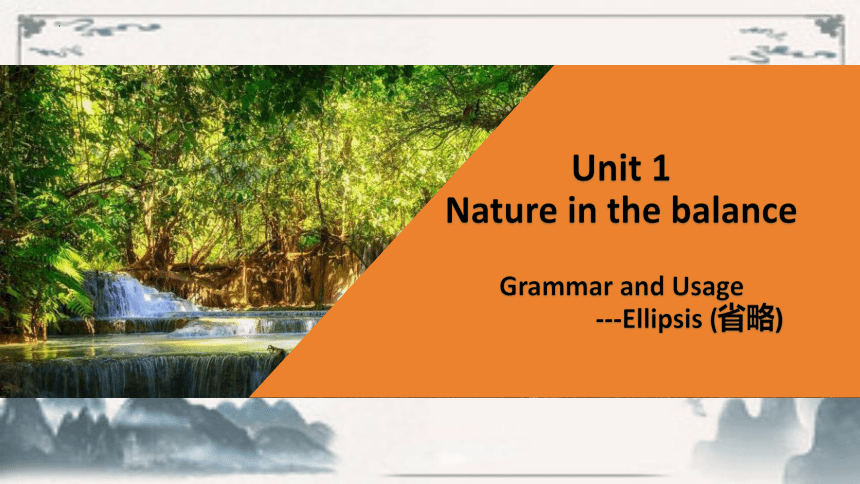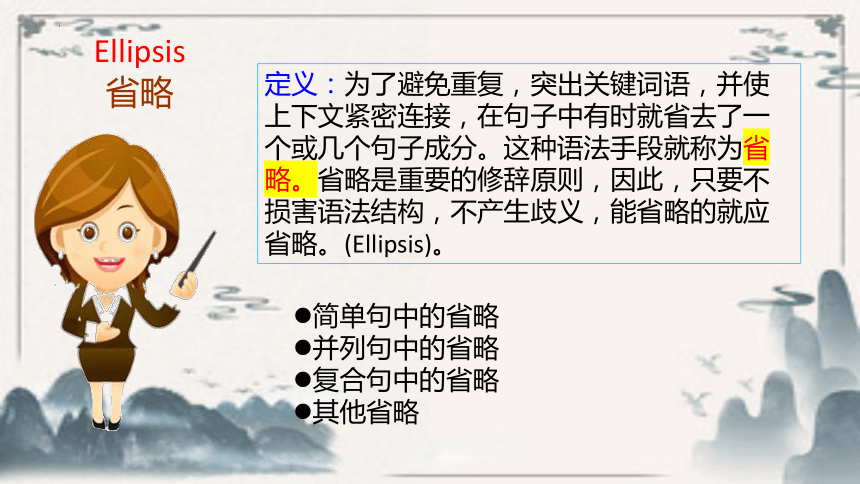牛津译林版(2019)必修 第三册Unit 1 Nature in the balance Grammar and usage 课件(共36张PPT)
文档属性
| 名称 | 牛津译林版(2019)必修 第三册Unit 1 Nature in the balance Grammar and usage 课件(共36张PPT) |  | |
| 格式 | pptx | ||
| 文件大小 | 1.3MB | ||
| 资源类型 | 教案 | ||
| 版本资源 | 牛津译林版(2019) | ||
| 科目 | 英语 | ||
| 更新时间 | 2024-03-19 15:08:36 | ||
图片预览












文档简介
(共36张PPT)
Unit 1
Nature in the balance
Grammar and Usage
---Ellipsis (省略)
Lead-in
Do you understand these elliptical sentences(省略句)
Beg your pardon
Nice to meet you.
Sorry to hear that.
What a good idea
My father planned and built all these houses
I don' t like the way he talks.
We' ll go to help you if necessary.
We will do what we can (do) to help you.
The sooner,the better.
Beg your pardon
Nice to meet you.
Sorry to hear that.
What a good idea!
I don' t like the way he talks.
We' ll go to help you if necessary.
The sooner,the better.
Ellipsis
省略
定义:为了避免重复,突出关键词语,并使上下文紧密连接,在句子中有时就省去了一个或几个句子成分。这种语法手段就称为省略。省略是重要的修辞原则,因此,只要不损害语法结构,不产生歧义,能省略的就应省略。(Ellipsis)。
简单句中的省略
并列句中的省略
复合句中的省略
其他省略
简单句中的省略
一、简单句中的省略
1..感叹句中常省略主语和谓语
What a hot day(it is)!多热的天啊!
How wonderful (it is/they are)!(它/他们)多棒啊!
2.祈使句中的主语通常被省略
① (You) Come in, please.
② (I) See you tomorrow.
③ (I) Thank you for your help.
④ (I) Beg your pardon.
一、简单句中的省略
3.在情景会话中,答语常常省略不会引起歧义的主语、谓语或宾语部分,而只个保留对方希望了解的内容
① (Is there) Anything else
②----Are you feeling better now
---(I'm feeling) Much better.
③----Have you ever been to the Great Wall
---- No, (I have) never (been to the Great Wall)
一、简单句中的省略
并列句中的省略
二、并列句中的省略
两个并列分句中,后一分句常省略与前一分句中相同的部分。
(1)如果主语相同,而谓语不同,则可以省略主语:
①He gave up drinking for several days, but (he) soon returned to his old ways.他戒酒了几天,但很快又恢复了老习惯。
②She came forward and (she) shook hands with me.
她走上前和我握了手。
两个并列分句中,后一分句常省略与前一分句中相同的部分。
(2).如果主语不同,而谓语动词中的一部分相同,则省略谓语动词中相同的部分
①John must have been playing basketball and Mary (must have
been) doing her homework.
约翰一定是在打篮球,而玛丽一定是在做作业,
二、并列句中的省略
两个并列分句中,后一分句常省略与前一分句中相同的部分。
(3).如果主语相同,谓语动词也相同,则二者都可以省略
His advice made John happy, but (his advice made) Mary angry.
补充:如果前后两个简单句的部分有相同也可省略
The little boy wanted to drive his toy car to the shopping center alone,but his mother told him not to (drive his toy car to the shopping center alone).
二、并列句中的省略
三、复合句中的省略
在时间、条件、地点、让步和方式状语从句中,当状语从句中的主语和主句的主语一致,或状语从句中的主语是it,并且又含有be动词时,常可以省略从句中的主语和be动词:
①Do be careful when (you are) crossing the street.过马路时一定要小心。
②You shouldn't come to his party unless (you are) invited.除非你被邀请,否则你不应该来参加他的聚会。
③Lay these books where (it is) possible you can find them easily.把这些书放在你可能容易找到的地方。
④Whether (she is) sick or well, she is always cheerful.
不管她病了还是好了,她总是兴高采烈的。
⑤He did as (he was) told.他照吩咐做了。
三、复合句中的省略之 状语从句的省略
(1)在限制性定语从句中,作宾语用的关系代词 whom, which,that可省略(但 whom,which紧跟在介词后时不能省略)。
(2)在以the same..as….或such..as…..引导的某些定语从句中,也可省略与主语相同的部分。
(3)修饰 way的关系词that/inwhich可以省略:
①The book (which/that) I borrowed yesterday was hers.
我昨天借你的那本书是她的。
② The man (whom) you saw on the street once saved my life.
你在街上看到的那个人曾救了我的命。
③I have the same trouble as you (have).我和你有同样的困难。
④The way (that/in which) he speaks to us is really annoying.他对我们讲话的方式真是让人讨厌。
三、复合句中的省略之 定语从句的省略
1.在某些情况下,由which, when,where,how,why引导的宾语从句中可全部或部分省略:
①Someone has used my bike, but I don't know who (has used my bike)
有人用过我的自行车,但我不知道是谁用过我的自行车。
② He has gone, but no one knows where (he has gone).
他走了,但没人知道他去哪儿了。
三、复合句中的省略之 宾语从句的省略
2.引导宾语从句的连词that在口语中常常省略,若带有多个宾语从句,则只有第一个that可以省略
①He said (that) he had arrived here two days before and that he had lived in a hotel他说他是两天前到这里的,他住在一家旅馆里。
3.在I’m afraid, I think, I believe, I hope, I guess等开头的作答句中,后面跟so与 not分别用于肯定或否定宾语时,宾语从句可省去。(替代性省略)
- Do you think it will rain
- I hope (that it will) not (rain).
三、复合句中的省略之 宾语从句的省略
四、不定式符号to的省略
1.某些使役动词 (let, make, have)及感官动词 (see, watch, hear, notice, observe, feel, look at, listen to等) 后面作宾语补足语的不定式一定要省去to, 但在被动语态中须将to复原。
①I saw the boy fall from the tree.
The boy was seen to fall from the tree.
②The boss made us work 12 hours a day.
We were made to work 12 hours a day.
四、不定式符号to的省略
2.并列的不定式可以省略后面的不定式符号to。但若两个不定式之间表示对比关系时,不能省略。
①. But she didn't know whether to go on or to stop.
四、不定式符号to的省略
2.有些动词,如 want, wish, expect, hope, would like, would love, mean, try, forget等接不定式作宾语时,为了避免重复,可以省略动词,但要保留不定式符号to。
①I have asked her to come, but she does not want to(come)我已请她来,但她不愿意来。
②---Are you and Jane getting married 你和简要结婚了吗
---We hope to (get married)我们希望(结婚)
四、不定式符号to的省略
五、虚拟语气中的省略
1.虚拟条件句省略if, 但要将should, were或had提前构成部分倒装。
If I were you, I would give it up.
Were I you, I would give it up.
五、虚拟语气中的省略
2.在一坚持(insist),二命令(order,command),三建议2 (suggest, propose, advise),四要求(demand, require,th request,ask)等后的宾语从句中,含这些词的派生词的其他主语从句、同位语从句、表语从句,以及It is strange/natural/ necessary/important that…从句中常省略should。
We insist that they (should) go with us.
五、虚拟语气中的省略
六、其它省略
Review 常见的介词可省的固定结构有:
have difficulty/trouble (in) doing sth
be busy (in) doing sth
spend some time (in) doing sth
stop/prevent sb (from) doing sth
There is no sense/point (in) doing sth
It's no good/use (in) doing sth
介词的省略
No parking.
(Parking is not allowed here.)
Quiet!
(You should be quiet here.)
Turandot on stage.
(The opera Turandot is being performed
on stage.)
一些特殊结构中的省略。
(1) signs/labels
(2) newspaper headlines
Best wishes.
(I give you my best wishes.)
Opera OK, costumes great.
(The opera was OK, and the costumes
were great.)
(3) postcards/diaries
(4) notes
1 No, I didn’t (
).
2 You can watch it online if you want to ( ).
3 I felt worried when ( ) watching the documentary.
4 Some call for the application of modern technology, and others ( ) a change of lifestyle.
5 ( ) Got any ideas
6 ( ) Sounds great!
watch it
I was
call for
Have you
It/That
watch the documentary about environmental protection on TV yesterday
Why do people leave them out
1 No, I didn’t (
).
2 You can watch it online if you want to ( ).
3 I felt worried when ( ) watching the documentary.
4 Some call for the application of modern technology, and others ( ) a change of lifestyle.
5 ( ) Got any ideas
6 ( ) Sounds great!
watch it
I was
call for
Have you
It/That
watch the documentary about environmental protection on TV yesterday
Why do people leave them out
We sometimes use ellipsis to avoid _________ (stressing/repeating) one or more words when the meaning is clear.
We can use ellipsis:
repeating
Work out the rules
in short responses;
in infinitive phrases;
after some conjunctions like if, when and while;
in clauses with the same pattern and the same verb;
at the beginning of a sentence in ___________ (informal/formal) speech.
informal
1. 省略的概念:为了使语言简洁或避免重复,省略句中的一个或几个句子成分。
2. 省略的情况
(1) 简单句中的省略:① 省略主语 ②省略主语或谓语的一部分 ③省略宾语 ④省略表语 ⑤同时省略几个句子成分
(2) 并列句中的省略:两个并列分句中,后一分句常省略与前一分句中相同的部分
(3) 复合句中的省略:①主句中的省略 ②定语从句中的省略 ③宾语从句中的省略 ④状语从句中的省略
(4) 其他省略:①不定式符号to的省略 ② 条件从句中有should, were或had时, 可以省略if, 但要将should, were或had提至句首 ③一些特殊结构中的省略
summary
B1--Find the mistakes and rewrite the sentences using ellipsis.
1. I cannot watch the documentary this weekend,
though I would like.
_____________________________________
_____________________________
I cannot watch the documentary this weekend, though I would like to.
Reason: We cannot leave out to in infinitives when using
ellipsis.
2. Cows live on land, and fish the water.
__________________________________
Cows live on land, and fish in the water.
Reason: Different prepositions are used and they can’t
be left out.
Applying the rules
3. The Amazon rainforest is smaller now than was
50 years ago.
______________________________________
___________________
Reason: When using ellipsis in clauses with the same
pattern, the subject and the verb should be left
out altogether.
4. He had planned to borrow a book on environmental
protection, but he didn’t do.
________________________________________
____________________________
Reason: When using ellipsis in compound sentences, the
part behind the auxiliary verb should be left out
altogether.
He had planned to borrow a book on environmental protection, but he didn’t.
The Amazon rainforest is smaller now than 50 years ago.
5. When taking photos of wildlife, every effort should
be made to ensure that we keep away from the
animals.
______________________________________
______________________________________
_____________________.
When taking photos of wildlife, we should make
every effort to ensure that we keep away from
the animals
Reason: When using ellipsis in adverbial clauses, we
need to make sure that the subject of the main
clause is the same as the subject of the
subordinate clause.
B2 --Jack is sharing with his classmates his experience of taking part in a forest clean-up activity. Use ellipsis where necessary. Put brackets around the word(s) that can be left out.
B3--In pairs, describe the pictures below using ellipsis to call for the protection of the environment. Use the example to help you. You can also draw a picture and think of a slogan.
When the water is too dirty to drink and the air (is) too polluted to breathe, will you be able to look at your children and say, “What a beautiful world (it is)!”
Unit 1
Nature in the balance
Grammar and Usage
---Ellipsis (省略)
Lead-in
Do you understand these elliptical sentences(省略句)
Beg your pardon
Nice to meet you.
Sorry to hear that.
What a good idea
My father planned and built all these houses
I don' t like the way he talks.
We' ll go to help you if necessary.
We will do what we can (do) to help you.
The sooner,the better.
Beg your pardon
Nice to meet you.
Sorry to hear that.
What a good idea!
I don' t like the way he talks.
We' ll go to help you if necessary.
The sooner,the better.
Ellipsis
省略
定义:为了避免重复,突出关键词语,并使上下文紧密连接,在句子中有时就省去了一个或几个句子成分。这种语法手段就称为省略。省略是重要的修辞原则,因此,只要不损害语法结构,不产生歧义,能省略的就应省略。(Ellipsis)。
简单句中的省略
并列句中的省略
复合句中的省略
其他省略
简单句中的省略
一、简单句中的省略
1..感叹句中常省略主语和谓语
What a hot day(it is)!多热的天啊!
How wonderful (it is/they are)!(它/他们)多棒啊!
2.祈使句中的主语通常被省略
① (You) Come in, please.
② (I) See you tomorrow.
③ (I) Thank you for your help.
④ (I) Beg your pardon.
一、简单句中的省略
3.在情景会话中,答语常常省略不会引起歧义的主语、谓语或宾语部分,而只个保留对方希望了解的内容
① (Is there) Anything else
②----Are you feeling better now
---(I'm feeling) Much better.
③----Have you ever been to the Great Wall
---- No, (I have) never (been to the Great Wall)
一、简单句中的省略
并列句中的省略
二、并列句中的省略
两个并列分句中,后一分句常省略与前一分句中相同的部分。
(1)如果主语相同,而谓语不同,则可以省略主语:
①He gave up drinking for several days, but (he) soon returned to his old ways.他戒酒了几天,但很快又恢复了老习惯。
②She came forward and (she) shook hands with me.
她走上前和我握了手。
两个并列分句中,后一分句常省略与前一分句中相同的部分。
(2).如果主语不同,而谓语动词中的一部分相同,则省略谓语动词中相同的部分
①John must have been playing basketball and Mary (must have
been) doing her homework.
约翰一定是在打篮球,而玛丽一定是在做作业,
二、并列句中的省略
两个并列分句中,后一分句常省略与前一分句中相同的部分。
(3).如果主语相同,谓语动词也相同,则二者都可以省略
His advice made John happy, but (his advice made) Mary angry.
补充:如果前后两个简单句的部分有相同也可省略
The little boy wanted to drive his toy car to the shopping center alone,but his mother told him not to (drive his toy car to the shopping center alone).
二、并列句中的省略
三、复合句中的省略
在时间、条件、地点、让步和方式状语从句中,当状语从句中的主语和主句的主语一致,或状语从句中的主语是it,并且又含有be动词时,常可以省略从句中的主语和be动词:
①Do be careful when (you are) crossing the street.过马路时一定要小心。
②You shouldn't come to his party unless (you are) invited.除非你被邀请,否则你不应该来参加他的聚会。
③Lay these books where (it is) possible you can find them easily.把这些书放在你可能容易找到的地方。
④Whether (she is) sick or well, she is always cheerful.
不管她病了还是好了,她总是兴高采烈的。
⑤He did as (he was) told.他照吩咐做了。
三、复合句中的省略之 状语从句的省略
(1)在限制性定语从句中,作宾语用的关系代词 whom, which,that可省略(但 whom,which紧跟在介词后时不能省略)。
(2)在以the same..as….或such..as…..引导的某些定语从句中,也可省略与主语相同的部分。
(3)修饰 way的关系词that/inwhich可以省略:
①The book (which/that) I borrowed yesterday was hers.
我昨天借你的那本书是她的。
② The man (whom) you saw on the street once saved my life.
你在街上看到的那个人曾救了我的命。
③I have the same trouble as you (have).我和你有同样的困难。
④The way (that/in which) he speaks to us is really annoying.他对我们讲话的方式真是让人讨厌。
三、复合句中的省略之 定语从句的省略
1.在某些情况下,由which, when,where,how,why引导的宾语从句中可全部或部分省略:
①Someone has used my bike, but I don't know who (has used my bike)
有人用过我的自行车,但我不知道是谁用过我的自行车。
② He has gone, but no one knows where (he has gone).
他走了,但没人知道他去哪儿了。
三、复合句中的省略之 宾语从句的省略
2.引导宾语从句的连词that在口语中常常省略,若带有多个宾语从句,则只有第一个that可以省略
①He said (that) he had arrived here two days before and that he had lived in a hotel他说他是两天前到这里的,他住在一家旅馆里。
3.在I’m afraid, I think, I believe, I hope, I guess等开头的作答句中,后面跟so与 not分别用于肯定或否定宾语时,宾语从句可省去。(替代性省略)
- Do you think it will rain
- I hope (that it will) not (rain).
三、复合句中的省略之 宾语从句的省略
四、不定式符号to的省略
1.某些使役动词 (let, make, have)及感官动词 (see, watch, hear, notice, observe, feel, look at, listen to等) 后面作宾语补足语的不定式一定要省去to, 但在被动语态中须将to复原。
①I saw the boy fall from the tree.
The boy was seen to fall from the tree.
②The boss made us work 12 hours a day.
We were made to work 12 hours a day.
四、不定式符号to的省略
2.并列的不定式可以省略后面的不定式符号to。但若两个不定式之间表示对比关系时,不能省略。
①. But she didn't know whether to go on or to stop.
四、不定式符号to的省略
2.有些动词,如 want, wish, expect, hope, would like, would love, mean, try, forget等接不定式作宾语时,为了避免重复,可以省略动词,但要保留不定式符号to。
①I have asked her to come, but she does not want to(come)我已请她来,但她不愿意来。
②---Are you and Jane getting married 你和简要结婚了吗
---We hope to (get married)我们希望(结婚)
四、不定式符号to的省略
五、虚拟语气中的省略
1.虚拟条件句省略if, 但要将should, were或had提前构成部分倒装。
If I were you, I would give it up.
Were I you, I would give it up.
五、虚拟语气中的省略
2.在一坚持(insist),二命令(order,command),三建议2 (suggest, propose, advise),四要求(demand, require,th request,ask)等后的宾语从句中,含这些词的派生词的其他主语从句、同位语从句、表语从句,以及It is strange/natural/ necessary/important that…从句中常省略should。
We insist that they (should) go with us.
五、虚拟语气中的省略
六、其它省略
Review 常见的介词可省的固定结构有:
have difficulty/trouble (in) doing sth
be busy (in) doing sth
spend some time (in) doing sth
stop/prevent sb (from) doing sth
There is no sense/point (in) doing sth
It's no good/use (in) doing sth
介词的省略
No parking.
(Parking is not allowed here.)
Quiet!
(You should be quiet here.)
Turandot on stage.
(The opera Turandot is being performed
on stage.)
一些特殊结构中的省略。
(1) signs/labels
(2) newspaper headlines
Best wishes.
(I give you my best wishes.)
Opera OK, costumes great.
(The opera was OK, and the costumes
were great.)
(3) postcards/diaries
(4) notes
1 No, I didn’t (
).
2 You can watch it online if you want to ( ).
3 I felt worried when ( ) watching the documentary.
4 Some call for the application of modern technology, and others ( ) a change of lifestyle.
5 ( ) Got any ideas
6 ( ) Sounds great!
watch it
I was
call for
Have you
It/That
watch the documentary about environmental protection on TV yesterday
Why do people leave them out
1 No, I didn’t (
).
2 You can watch it online if you want to ( ).
3 I felt worried when ( ) watching the documentary.
4 Some call for the application of modern technology, and others ( ) a change of lifestyle.
5 ( ) Got any ideas
6 ( ) Sounds great!
watch it
I was
call for
Have you
It/That
watch the documentary about environmental protection on TV yesterday
Why do people leave them out
We sometimes use ellipsis to avoid _________ (stressing/repeating) one or more words when the meaning is clear.
We can use ellipsis:
repeating
Work out the rules
in short responses;
in infinitive phrases;
after some conjunctions like if, when and while;
in clauses with the same pattern and the same verb;
at the beginning of a sentence in ___________ (informal/formal) speech.
informal
1. 省略的概念:为了使语言简洁或避免重复,省略句中的一个或几个句子成分。
2. 省略的情况
(1) 简单句中的省略:① 省略主语 ②省略主语或谓语的一部分 ③省略宾语 ④省略表语 ⑤同时省略几个句子成分
(2) 并列句中的省略:两个并列分句中,后一分句常省略与前一分句中相同的部分
(3) 复合句中的省略:①主句中的省略 ②定语从句中的省略 ③宾语从句中的省略 ④状语从句中的省略
(4) 其他省略:①不定式符号to的省略 ② 条件从句中有should, were或had时, 可以省略if, 但要将should, were或had提至句首 ③一些特殊结构中的省略
summary
B1--Find the mistakes and rewrite the sentences using ellipsis.
1. I cannot watch the documentary this weekend,
though I would like.
_____________________________________
_____________________________
I cannot watch the documentary this weekend, though I would like to.
Reason: We cannot leave out to in infinitives when using
ellipsis.
2. Cows live on land, and fish the water.
__________________________________
Cows live on land, and fish in the water.
Reason: Different prepositions are used and they can’t
be left out.
Applying the rules
3. The Amazon rainforest is smaller now than was
50 years ago.
______________________________________
___________________
Reason: When using ellipsis in clauses with the same
pattern, the subject and the verb should be left
out altogether.
4. He had planned to borrow a book on environmental
protection, but he didn’t do.
________________________________________
____________________________
Reason: When using ellipsis in compound sentences, the
part behind the auxiliary verb should be left out
altogether.
He had planned to borrow a book on environmental protection, but he didn’t.
The Amazon rainforest is smaller now than 50 years ago.
5. When taking photos of wildlife, every effort should
be made to ensure that we keep away from the
animals.
______________________________________
______________________________________
_____________________.
When taking photos of wildlife, we should make
every effort to ensure that we keep away from
the animals
Reason: When using ellipsis in adverbial clauses, we
need to make sure that the subject of the main
clause is the same as the subject of the
subordinate clause.
B2 --Jack is sharing with his classmates his experience of taking part in a forest clean-up activity. Use ellipsis where necessary. Put brackets around the word(s) that can be left out.
B3--In pairs, describe the pictures below using ellipsis to call for the protection of the environment. Use the example to help you. You can also draw a picture and think of a slogan.
When the water is too dirty to drink and the air (is) too polluted to breathe, will you be able to look at your children and say, “What a beautiful world (it is)!”
同课章节目录
- Unit 1 Nature in the balance
- Welcome to the unit
- Reading
- Grammar and usage
- Integrated skills
- Extended reading
- Project
- Unit 2 Natural disasters
- Welcome to the unit
- Reading
- Grammar and usage
- Integrated skills
- Extended reading
- Project
- Unit 3 The world online
- Welcome to the unit
- Reading
- Grammar and usage
- Integrated skills
- Extended reading
- Project
- Unit 4 Scientists who changed the world
- Welcome to the unit
- Reading
- Grammar and usage
- Integrated skills
- Extended reading
- Project
